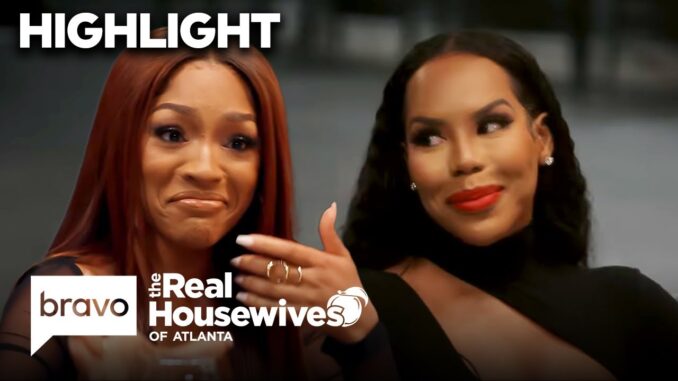
The Uncomfortable Dance of Reality: Kelli Ferrell, Drew Sidora, and the Anatomy of a Reality TV Exit
Reality television thrives on manufactured drama, carefully curated narratives, and the simmering tension between personalities thrown together in a pressure cooker. When someone abruptly leaves this concoction, it rarely goes unnoticed, and the fallout often becomes a storyline in itself. Kelli Ferrell questioning Drew Sidora’s abrupt departure from her event, whatever the event may be, exemplifies this dynamic perfectly. It's a scenario ripe with implied accusations, wounded feelings, and the unspoken understanding that everything, even perceived betrayal, is ultimately fodder for the cameras.
To understand the weight of Ferrell’s questions, one must first acknowledge the unspoken contract inherent in reality TV. Cast members are expected to participate, engage, and contribute to the narrative, even if it means facing personal discomfort or conflict. Their willingness to play the game, to expose their vulnerabilities and flaws, is what fuels the show. Sidora's exit, therefore, represents a disruption of this contract. It's a refusal to participate, a pulling back from the carefully orchestrated chaos. This is not only frustrating for the producers who rely on consistent engagement, but also for the other cast members, like Ferrell, who have invested their time and energy in the event and the show as a whole.
Ferrell's questions are likely layered with a multitude of motivations. At its surface, there might be genuine concern. Perhaps Ferrell genuinely believes Sidora's departure was impolite, disrespectful, or even strategically motivated to avoid a pre-existing conflict. Maybe she feels personally affronted by Sidora’s perceived snub, believing that the event was important and that Sidora's presence was vital. The questions, then, become a public airing of this personal grievance, a demand for explanation and perhaps even an apology.
However, the reality TV lens magnifies everything, and it's highly improbable that Ferrell's motivations are purely innocent. The inherent competition in reality television often breeds suspicion and calculation. Sidora's exit could be interpreted as a strategic maneuver to avoid a confrontation, potentially leaving Ferrell vulnerable or unchallenged. Therefore, questioning the exit becomes a way for Ferrell to maintain control of the narrative. It allows her to reframe the situation, to position herself as the wronged party, and to potentially cast Sidora in a negative light. The questions become less about genuine concern and more about strategic maneuvering, about maintaining her position within the pecking order of the show.
Furthermore, the cameras themselves are an undeniable factor. The presence of a film crew transforms every interaction into a performance, every emotion into a potential storyline. Ferrell's questions are not simply a private conversation; they are a public statement, designed to resonate with viewers and fuel online discussions. She is playing to the audience, knowing that her words will be dissected, debated, and ultimately contribute to her overall image on the show. In this context, the genuineness of her concern becomes almost irrelevant. What matters is the impact of her words, the way they shape the narrative and influence the audience's perception of both her and Sidora.
The beauty, and sometimes the ugliness, of this scenario lies in its inherent ambiguity. We, the viewers, are left to interpret the motivations behind Ferrell’s questions. Are they rooted in genuine hurt and disappointment? Or are they a calculated attempt to manipulate the narrative and solidify her position within the show? Perhaps it's a combination of both. The brilliance of reality television lies in its ability to blur the lines between authenticity and performance, leaving us questioning the true nature of the relationships and the motivations behind every action.
Ultimately, Kelli Ferrell questioning Drew Sidora’s exit from her event is more than just a social faux pas; it’s a microcosm of the complexities and tensions that define reality television. It's a dance between genuine emotion and strategic manipulation, a testament to the pressures of performing under the constant gaze of the camera, and a stark reminder that in the world of reality TV, even an exit can become a pivotal moment in the ongoing drama. The real question, then, is not simply why Sidora left, but how Ferrell will use her departure to shape her own narrative and navigate the ever-shifting landscape of reality television.